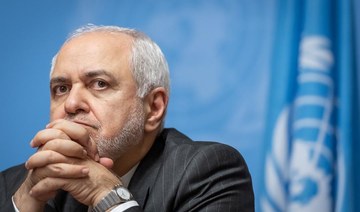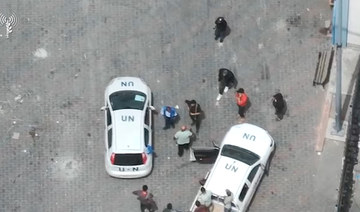ANKARA: The European Court of Human Rights (ECtHR) put rights violation cases in Turkey under the spotlight this month with several rulings on its agenda.
On Dec. 15, the European top court ruled that the Turkish government violated the rights of an employee who was dismissed by a state of emergency decree.
The court said that Turkey violated the employee’s right to a fair trial and right to respect for his private and family life after he was sacked from his post at the public administration over claims of his links to terror groups.
ECtHR ruled that, even in cases where national security had to be considered, the principles of lawfulness and the rule of law should be applied when taking measures that affect an individual’s fundamental rights.
The court sentenced Turkey to pay €4,000 ($4,875) to Hamit Piskin, the applicant, in violation of articles 6 and 8 of the European Convention on Human Rights that Turkey is signed up to as a contracting party.
According to Ayse Bingol Demir, a human rights lawyer and co-director of the Turkey Human Rights Litigation Support Project, the Piskin case concerns the serious human rights violations of Turkey in the course of the state of emergency declared following the July 2016 coup attempt.
“More than four years on, we are starting to hear the voice of the court on the question of the compatibility of the government’s actions with the European Convention on Human Rights,” she told Arab News.
However, Demir added, whether the court’s reaction was strong enough was a matter for consideration.
“Although the court found violations of Article 6 and 8 of the convention in this case, there are several aspects of the court’s interpretations that are problematic, and this might prevent this judgment being a strong basis for those who have been impacted by the emergency decrees in their quests to obtain remedy for the violations they have endured,” she said.
In the meantime, ECtHR will deliver a Grand Chamber judgment in the case of imprisoned Kurdish politician Selahattin Demirtas v. Turkey on Tuesday, Dec. 22.
The Demirtas case is widely considered by human rights groups to be a politically motivated prosecution.
The case is about the arrest and pre-trial detention of Demirtas, the former co-chair of the Peoples’ Democratic Party (HDP), Turkey’s left-wing, pro-Kurdish and second-largest opposition party.
Demirtas challenged Turkish President Recep Tayyip Erdogan in the 2014 and 2018 presidential elections, attracting 9.76 percent and 8.32 percent of the vote respectively from almost every part of society.
He was arrested on Nov. 4, 2016, in the middle of the night, over his alleged incitement of the violent street demonstrations across Turkey’s southeastern provinces in October 2014 after Daesh attacked the Syrian Kurdish town of Kobani. The protests in Turkey caused the death of 50 people and hundreds were injured.
The detention of the deputies was made possible at the time following a controversial constitutional amendment and parliamentary vote in May 2016 that ensured the lifting of their parliamentary immunity.
The Council of Europe’s Venice Commission, a European body that advises on constitutional matters, at the time harshly criticized the decision to lift parliamentary immunity, with the risk it carries for damaging democratic institutions in the country.
“Demirtas is one of the most prominent figures in the political scene in Turkey and has been unlawfully kept behind bars for over four years. The interference in the judicial proceedings against him, if not full control of them, by the executive has been so clear,” lawyer Demir said.
Demirtas, who has been imprisoned for four years and two months, lodged his application with the European Court four years ago after having exhausted all domestic remedies.
Previously, lawyers for Demirtas strongly criticized several aspects of the ECtHR Second Section’s earlier judgment in November 2018.
“The Grand Chamber will hopefully agree with their arguments and will properly address, recognize and duly criticize the seriousness of the issue of detention of political opponents and others for political purposes in Turkey,” Demir said.
International groups, such as Human Rights Watch and Article 19, assert that there is no material evidence about the connection of Demirtas to the Kobani protests, saying that the prosecution is only based on his public speeches and political activities as a leader of a political party at the time.
“This case was given priority, the court states. National judicial authorities detain individuals without a ground in 15 minutes. Then it takes ages to undo this decision before the ECtHR, even in the case of a prominent politician. Isn’t it the time to really reform the ECtHR?,” said Kerem Altiparmak, a human rights’ lawyer.
Rights advocacy groups also asked the Turkish government to review the detentions of other former HDP deputies, including the female co-chair of the party, Figen Yuksekdag, but the European Court of Human Rights has not ruled yet on these cases.
“The Turkish government has misused detention and criminal proceedings in a campaign of persecution against Demirtas in particular, including by flouting a European Court of Human Rights’ order to release him and concocting new baseless charges to keep him behind bars,” Human Rights Watch said in a press statement on Nov. 19.
However, Turkish rulers appear determined to keep Demirtas and the other HDP deputies behind bars, blaming them for terror acts in the country.
“Supporters of terrorism cannot be rewarded,” Turkish President Recep Tayyip Erdogan said last month, indicating his personal objection to releasing Demirtas.
In September, Erdogan also criticized HDP and its jailed ex-leader: “They have penetrated into the parliament. This nation does not and will not forget those who called the people into the streets and then in Diyarbakir had 53 of our children killed. We will follow this business to the end. We won’t release them.”




























